Scientific Publications of the Cologne Institute for Economic Research: IW-Trends, IW policy papers, IW-Analysen, IW-Studien, IW-Reports, IW-Kurzberichte and Expertises. Read more about our Approach to Research.
- Home
- Studies
Studies
- Bardt, Hubertus
- Beznoska, Martin
- Burstedde, Alexander
- Busch, Berthold
- Büchel, Jan
- Decker, Mareike
- Demary, Markus
- Demary, Vera
- Diermeier, Matthias
- Dietz, Annette
- Engels, Barbara
- Engler, Jan Felix
- Enste, Dominik H.
- Flake, Regina
- Fremerey, Melinda
- Geis-Thöne, Wido
- Gerards Iglesias, Simon
- Goecke, Henry
- Grömling, Michael
- Hammermann, Andrea
- Hentze, Tobias
- Hickmann, Helen
- Hüther, Michael
- Jansen, Anika
- Kauder, Björn
- Kirchhoff, Jasmina
- Kohlisch, Enno
- Kolev-Schaefer, Galina
- Koppel, Oliver
- Kroke, Thorsten
- Kunath, Gero
- Kurtenacker, Andrea
- Küper, Malte
- Lehr, Judith
- Lesch, Hagen
- Lichtenthäler, Sarah
- Malin, Lydia
- Matthes, Jürgen
- Mertens, Armin
- Metzler, Christoph
- Neligan, Adriana
- Niehues, Judith
- Oberst, Christian
- Obst, Thomas
- Parthie, Sandra
- Pierenkemper, Sarah
- Pimpertz, Jochen
- Potthoff, Jennifer
- Puls, Thomas
- Risius, Paula
- Rusche, Christian
- Röhl, Klaus-Heiner
- Sagner, Pekka
- Scheufen, Marc
- Schumacher, Simon
- Schäfer, Holger
- Schüler, Ruth Maria
- Seele, Stefanie
- Seyda, Susanne
- Sommer, Julian
- Stettes, Oliver
- Stockhausen, Maximilian
- Suling, Lena
- Sultan, Samina
- Taft, Niklas Florian
- Tiedemann, Jurek
- Vogel, Sandra
- Voigtländer, Michael
- Wendt, Jan
- Werner, Dirk
- Wildner, Julia
- Wörndl, Daniel
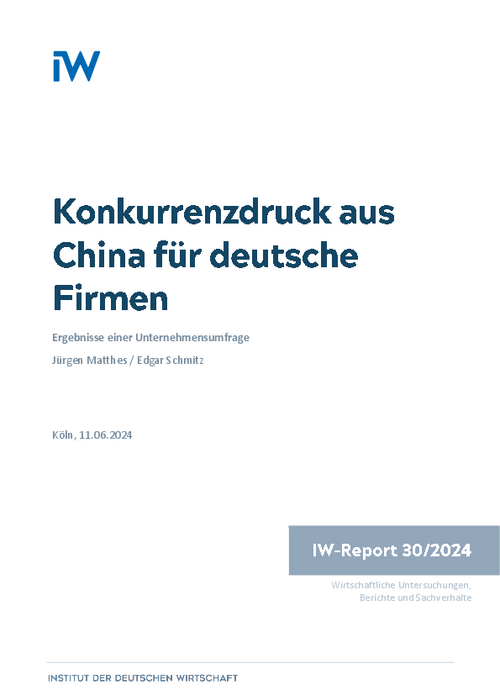
Competitive pressure from China for German companies
A firm survey conducted in March/April 2024 as part of the IW-Zukunftspanel among around 900 German companies from the manufacturing and industrial services sectors shows that around 350 of the companies surveyed have Chinese competitors in their markets.
Jürgen Matthes / Edgar Schmitz IW
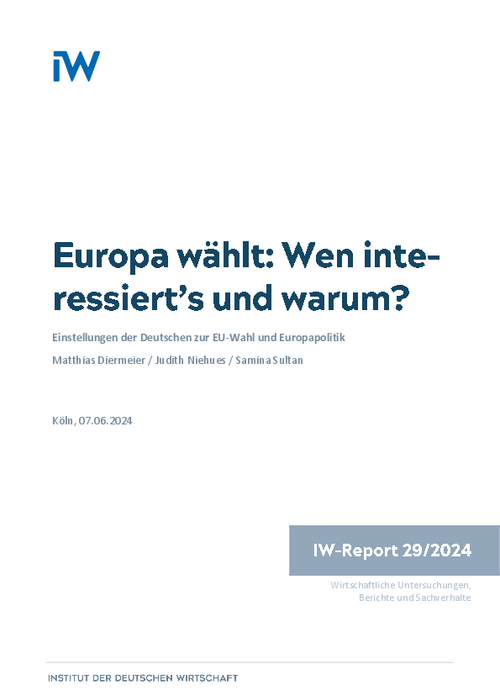
Europe votes: Who cares and why?
This study, based on the IW-People Survey 2024, shows that around 62% of Germans consider the election of the European Parliament to be important. This is the result of around 5,200 respondents. The proportion is therefore roughly as high as the voter turnout in 2019.
Matthias Diermeier / Judith Niehues / Samina Sultan IW
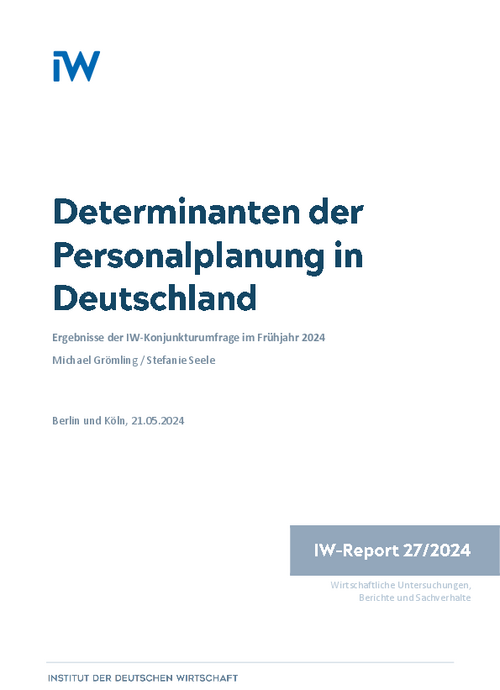
Determinants of personnel planning in Germany
The German labor market has been growing since 2005. The dip in the wake of the coronavirus pandemic between 2020 and 2022 is an exception, as the German labor market has reached a record level of 45.9 million people in employment by 2023.
Michael Grömling / Stefanie Seele IW
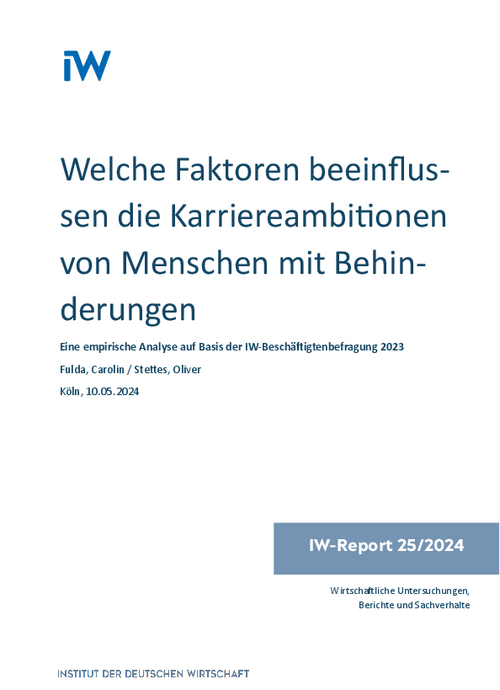
What factors influence the career ambitions of people with disabilities?
Many companies in Germany report having difficulties not only in recruiting employees, but also in filling vacant management positions.
Carolin Fulda / Oliver Stettes IW
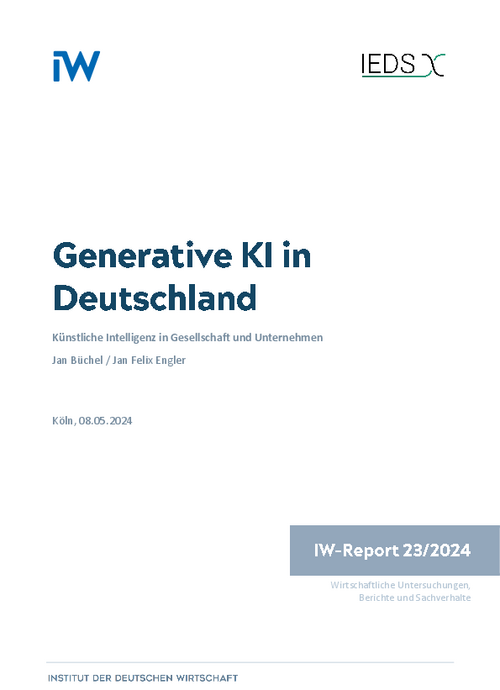
Generative AI in Germany: Artificial intelligence in society and companies
Generative AI has recently caused quite a stir. The reason is that generative AI applications can independently generate content such as texts, images, programming codes or videos that are often difficult to distinguish from human-generated content.
Jan Büchel / Jan Felix Engler IW
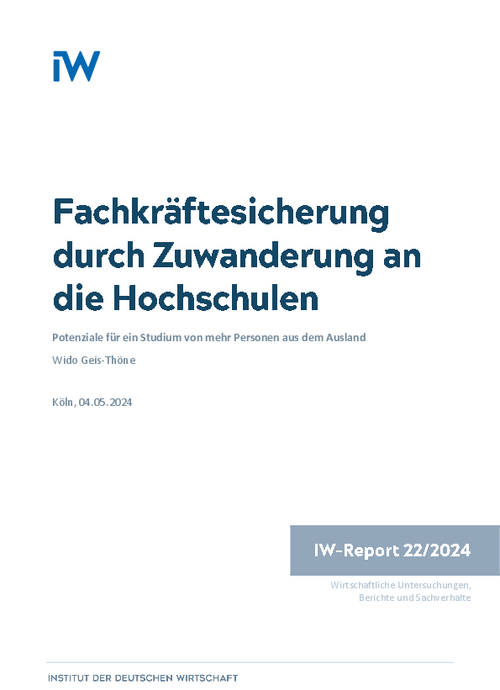
Securing skilled workers through immigration to universities
Against the backdrop of demographic change, Germany is increasingly dependent on skilled labour from abroad to secure growth and prosperity.
Wido Geis-Thöne IW
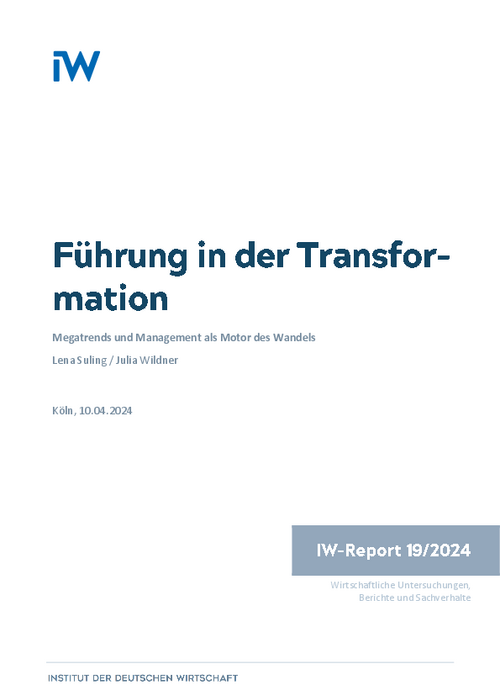
Leadership in transformation: Megatrends and management as a driver of change
Leadership dynamics in companies are subject to constant change in order to meet the challenges of their time. Today, the greatest influences result from developments such as demographic change, globalization, individualization, structural change and technologization in the economy.
Lena Suling / Julia Wildner IW
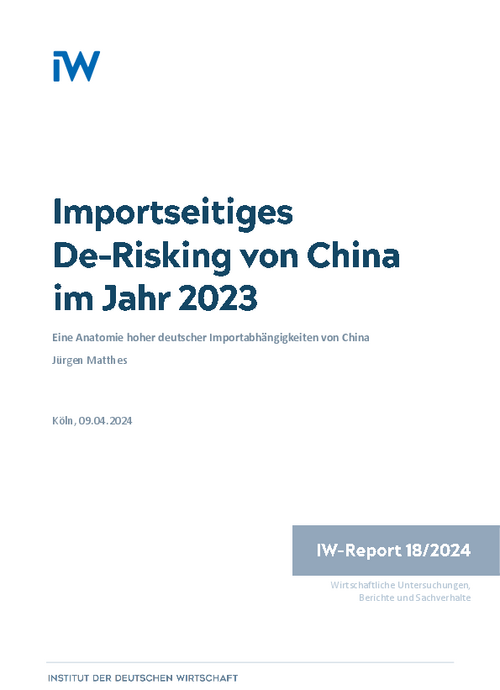
Import side De-risking China in 2023
Despite certain changes, German import dependencies on China remained at a similar level overall in 2023 as in the previous year in the overall picture. This means that de-risking on the import side can only be recognised to a limited extent.
Jürgen Matthes IW
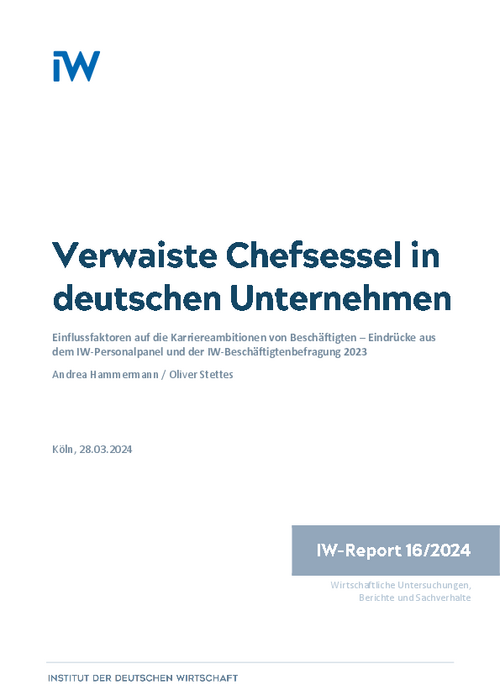
Orphaned executive chairs in German companies
In 2023, half of the companies in Germany reported increasing problems in filling vacancies for management positions because employees are not aiming for a career. Larger companies are less affected than small companies.
Andrea Hammermann / Oliver Stettes IW
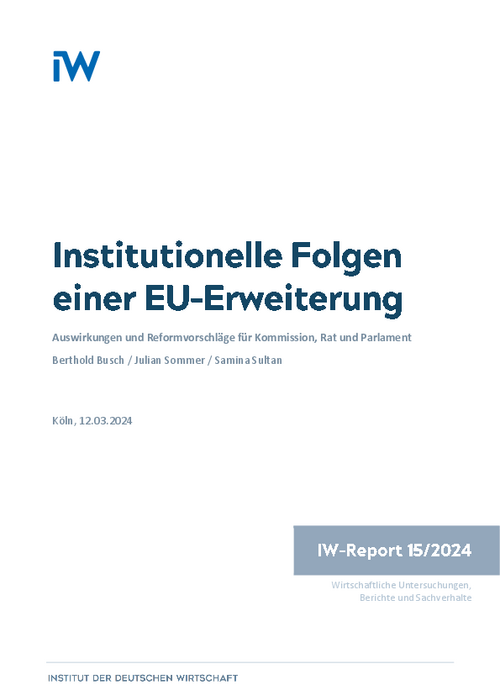
Institutional consequences of EU Enlargement
At the latest since the Russian war of aggression in Ukraine and the decision to open accession talks with the country, the topic of enlargement has once again become much more important for the European Union (EU).
Berthold Busch / Julian Sommer / Samina Sultan IW
Your search returned an incorrect status. You may have selected too many filters. You can jump back to your previous selection to adjust your search.
Understanding Science
- The scientific work of the German Economic Institute is independent and solution-oriented, internationally networked and socially relevant, methodologically open and interdisciplinary. We address the scientific discourse of experts, the general public as well as opinion leaders in politics, business and society. We want to be an audible voice in the economic policy discourse in Germany.
- Our work is innovative and confronts the scientific discourse: On the basis of scientifically recognized standards, we apply new methods, use new data sets, discuss new arguments and provide solution-oriented answers to current questions in economic analysis and economic policy. Our statements are theoretically founded and, where it is methodologically and empirically possible, evidence-based. We ensure that both the data basis and the methodological approaches are comprehensible. Modern methods of empirical economic and social research are as much a part of our tools as in-depth analyses of the institutional and political-economic conditions of economic developments.
- We do not exclude any theoretical and methodological approach, because diversity and competition promote progress in the sciences. The decisive factor is not a traditional paradigm, but whether and how a scientific approach leads further in the search for decision-guiding and action-relevant knowledge. Our research is not limited to economics, but is connectable to the debates and insights of other disciplines, such as ethics, history, education, political science, psychology, law, and sociology.
- Our research is aware of its normative conditionality. Every science of human social action requires a normative clarification of the concept of man. Freedom and (co-)responsibility are the central values for us. We see the human being as a being capable of freedom and responsibility, who in this sense is enabled and called upon to competent decisions and actions. In our view, open, liberal and democratic societies require a liberal and competitive economic order that counts personal responsibility and shared responsibility among its constitutive elements.
With our new newsletters on the following topics you no longer have an IW publication.
We send out our topic-specific newsletters every month.
Register here
With our new newsletters on the following topics you no longer have an IW publication.